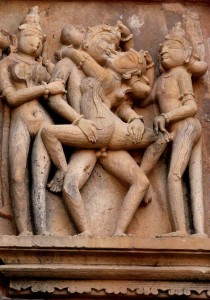 My teacher is a teacher of traditional advaita. I believe she is the only such teacher in the UK, if not in Europe. Some might look at what she teaches – Gita, Upaniṣads, Prakaraṇa Granthas (philosophical treatise) and stotras (devotional hymns) – and believe that they too, not only follow traditional advaita (because they too read these texts), but also have an additional, and arguably more powerful, key in the form of meditation or yoga or other such practice. Despite the surface similarity, however, I stick to my opening claim and will attempt to open up clear blue water between the teacher of traditional advaita simply by making clear what is mean by ‘traditional advaita’.
My teacher is a teacher of traditional advaita. I believe she is the only such teacher in the UK, if not in Europe. Some might look at what she teaches – Gita, Upaniṣads, Prakaraṇa Granthas (philosophical treatise) and stotras (devotional hymns) – and believe that they too, not only follow traditional advaita (because they too read these texts), but also have an additional, and arguably more powerful, key in the form of meditation or yoga or other such practice. Despite the surface similarity, however, I stick to my opening claim and will attempt to open up clear blue water between the teacher of traditional advaita simply by making clear what is mean by ‘traditional advaita’.
Two words set apart the traditional approach to teaching advaita from all others: sampradāya and pramāna.
Sampradāya is the established approach to unfolding the vision of Vedanta transmitted from one teacher to another. It is the traditional interpretation with a traceable lineage of teachers. Continue reading




